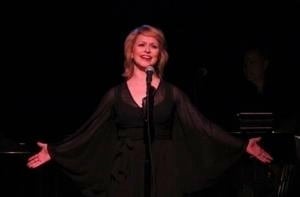
06.22.2015
OFFERING HER TAKE ON THE ELVIS COSTELLO SONGBOOK, KAREN OBERLIN REINVENTS HERSELF
Broadway World: Alix Cohen: 19th June 2015. Photo By Russ Weatherford.
With her new show His Aim Is True: The Singular Songs of Elvis Costello at Stage 72 (second show last night), you’ll meet the new Karen Oberlin. Gone are the controlled vibrato, upper range, emotional translucence, femininity, and the playfulness of a purveyor of American Songbook/pop. Prepare for a terse, tensile, alto-voiced, punk chick (including shag hairdo) with a foot in rudderless jazz. There’s nothing tentative in this raw, almost tone poem-like performance. Oberlin commits herself to her choices.
Bridged by brief, enlightening patter and occasional quotes, Oberlin offers 17 numbers written by Costello alone and with others. These include all but unknown collaborations with Paul McCartney and Burt Bacharach, selected perhaps for marquee value as they were among the weakest.
“Shipbuilding” (With Clive Langer) speaks to a childhood past Costello shared with fellow musician Sting. Here, it’s wartime. “. . . They were building ships to replace those that had been sunk, often with their sons onboard.” Or, as the song says: “Within weeks, they’ll be re-opening the shipyards/And notifying the next of kin, once again . . .” Oberlin is utterly sincere. Legato phrases emerge confident, but almost monotone. Sean Harkness’ lovely guitar (below in photo) response is melancholy.
“Aubergine” (with Brad Jones) is the first of intermittent jazz numbers that sound as if they might have been written in the bebop 1950s. It’s an amorphous, up-tempo song with a touch of swing, with lyrics all but swallowed by accompaniment. (Reading them after the fact, I’d be hard pressed to attribute meaning in any case.) Music Director Tedd Firth offers the kind of piano solo only real jazz men can execute–episodic, emphatic, wandering. (“What’s So Funny ‘Bout) Peace, Love and Understanding” (with Nick Lowe) is so fast, fraught, and impenetrable, lyrics are also lost.
Sometimes the artist’s performance rescues an otherwise oblique offering. “My Flame Burns Blue,” written to the last tune composed by Billy Strayhorn, is a sort of inebriated, melodic weave. Towards the end, Oberlin opens her throat exposing a brightness of sound kept under wraps up till now: “If I seem a stranger/I feel far from danger/We tamper and we toy/With passion over joy/Even though my flame burns blue.” The stage briefly glows.
“Veronica” (with Paul McCartney), here oddly and consistently pronounced “Veroni-ca-ah” (not as in any Costello recording I could find), is a story song about the writer’s dementia-riddled grandmother. Despite a shapeless, bruising tune and poetry without cadence, Oberlin sells the truth of its emotion.
For my money, the best on all counts is “Almost Blue.” Unlike any other Costello with which I’m familiar, the mellifluous, smoky torch says what it means. Oberlin’s sensitive, empathetic lamentation is completely on target. Her last “blue” stretches into three syllables, every one appealing.
Elvis Costello is an acquired taste. His dense, polyrhythmic work eludes accessible melody; latter-day hipster lyrics eschew not only rhymes but also syncing lyrical vocabulary. I’m not a fan. This prejudices me against the similar, colorless material, but not the singer. Karen Oberlin is out there with all she’s got. Unfortunately, these songs do not showcase her abilities. While I’m interested in her newfound range and pithy vocals and applaud her desire to explore, Costello buries what otherwise might garner praise.
The band’s musicianship is first rate. Besides consistency and above call-outs, Steve Doyle’s very cool bass contribution to “The Girl in The Other Room” is superb.
Karen Oberlin will again be performing His Aim Is True: The Singular Songs of Elvis Costello at Stage 72 (158 W. 72nd St.), NYC on June 25 and July 30, both at 7 pm.